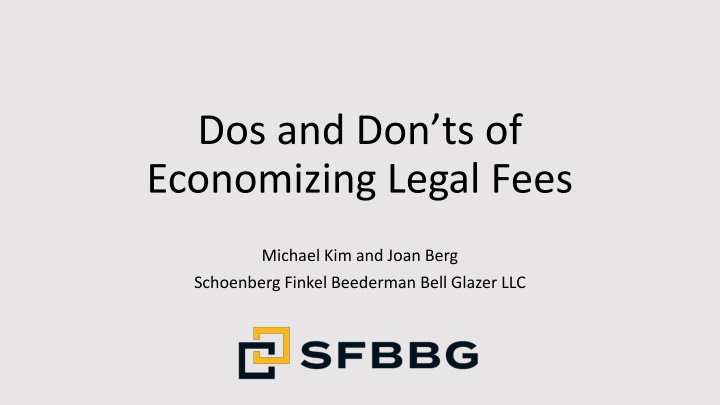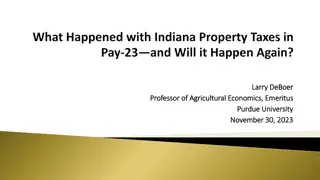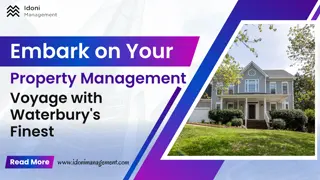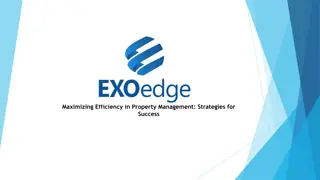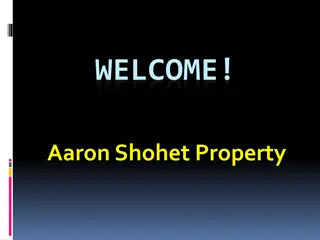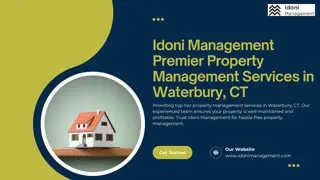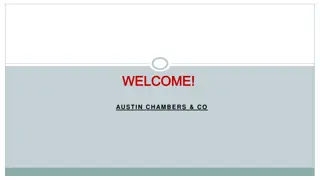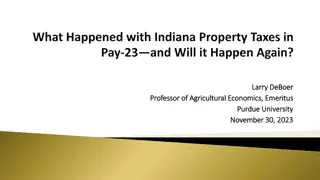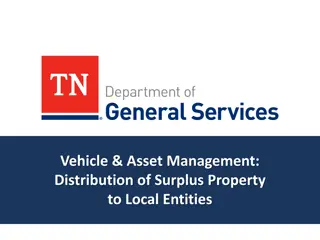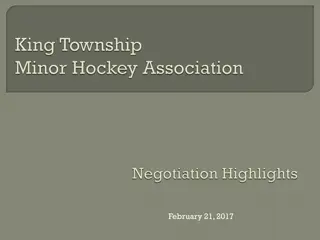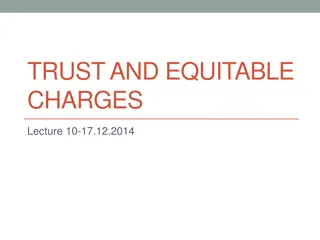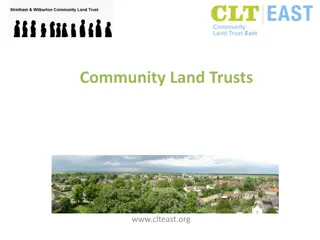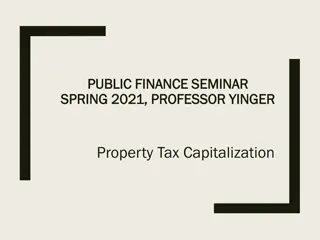Best Practices for Legal and Property Management Collaboration in Community Associations
Balancing legal counsel and property management responsibilities is essential in community associations to ensure compliance, resolve disputes, and maintain overall well-being. Collaboration between legal professionals and property managers promotes balance, effective operations, and adherence to laws. Addressing technical and ethical issues, navigating legal frameworks, and upholding obligations are crucial for successful governance. Stay updated on legislative changes, risk management, and financial strategies to support community associations effectively.
Download Presentation

Please find below an Image/Link to download the presentation.
The content on the website is provided AS IS for your information and personal use only. It may not be sold, licensed, or shared on other websites without obtaining consent from the author.If you encounter any issues during the download, it is possible that the publisher has removed the file from their server.
You are allowed to download the files provided on this website for personal or commercial use, subject to the condition that they are used lawfully. All files are the property of their respective owners.
The content on the website is provided AS IS for your information and personal use only. It may not be sold, licensed, or shared on other websites without obtaining consent from the author.
E N D
Presentation Transcript
Dos and Donts of Economizing Legal Fees Michael Kim and Joan Berg Schoenberg Finkel Beederman Bell Glazer LLC
Balancing legal counsel and property management responsibilities in community associations The relationship between legal counsel and property managers in community association management is dynamic and multifaceted, crucial for ensuring compliance, resolving disputes, and maintaining the overall well-being of the community. .
LEGAL GUIDANCE AND COMPLIANCE Collaboration Between Legal Counsel and Property Management Promotes Balance DISPUTE RESOLUTION RISK MANAGEMENT AND LITIGATION PREVENTION EDUCATION AND TRAINING STRATEGIC PLANNING AND GOVERNANCE
Collaboration Between Legal Counsel and Property Management Promotes Balance The relationship between legal counsel and property managers in community association management is characterized by collaboration, communication, and a shared commitment to upholding legal standards and protecting the interests of the community. By working together, legal professionals and property managers ensure that community associations operate smoothly, resolve disputes effectively, and comply with all relevant laws and regulations.
Obligations of Legal Counsel Technical Issues: Navigating the laws and regulations governing community associations involves addressing various technical issues that can arise due to the complexity of legal frameworks and the diverse nature of community association operations. Ethical Issues: Representing associations as an attorney involves navigating a complex landscape of ethical considerations, where obligations to the organization must be balanced with duties to individual members and the legal profession at large. Here's a discussion on some key ethical considerations
Legal Structure and Governance CC&Rs and Governing Documents Property Rights and Enforcement Financial Management and Budgeting Insurance and Risk Management Compliance with Fair Housing Laws Obligations of Legal Counsel: Technical Issues Dispute Resolution and Legal Proceedings Environmental and Regulatory Compliance Technology and Data Privacy Legislative and Regulatory Updates
Obligations of Legal Counsel: Ethical Issues Conflict of Interest Confidentiality Maintaining Attorney-Client Privilege Duty to the Organization vs. Individual Members
Obligations of the Property Manager Technical Issues. In addition to certification or licensure in property management or a related field, depending on local regulations, a community association property manager is responsible for the day-to-day management of a association property on behalf of the homeowners' association. They oversee various aspects of the property, including maintenance, financial management, and administration. Ethical Issues. Managing a community association involves navigating a complex web of ethical considerations, as the manager is responsible for upholding the rights and interests of both individual homeowners and the community as a whole.
Obligations of the Property Manager: Technical Issues Maintenance Management Financial Management Administrative Duties Property Inspections and Risk Management Emergency Response Legal Compliance
Obligations of the Property Manager: Ethical Issues Conflict of Interest Fair Treatment of Homeowners Transparency and Accountability Confidentiality Fair Vendor Selection Avoiding Discrimination Resolving Conflicts Compliance with Laws and Regulations
Addressing the Problem Clearly Defining Issues. Conducting legal audits and assessments is a critical practice for organizations to identify potential risks and areas for improvement in their legal compliance and governance frameworks. Telling the Story. Effectively communicating legal issues to board members, residents, and vendors while emphasizing transparency and accessibility is crucial for maintaining trust and ensuring compliance
Addressing the Problem: Clearly Defining the Issue Define Objectives and Scope Gather Documentation Legal Research and Benchmarking Interview Key Stakeholders Compliance Checklist Risk Assessment Gap Analysis Technology Solutions Continuous Monitoring and Review Training and Awareness
Addressing the Problem: Telling the Story Tailor Use Plain Language Provide Regular Updates Utilize Multiple Channels Communication to Audience Create Information Hubs Encourage Questions and Feedback Be Transparent About Challenges Provide Training and Education Seek Legal Counsel Follow Up
Advance Planning Project Planning. Proactively addressing potential legal issues is essential for an Association to mitigate risks and avoid costly disputes or litigation down the road. Legal Services Involvement. Collaborating with legal counsel throughout various stages of an Association s projects is vital for ensuring legal compliance, mitigating risks, and protecting the interests of the association and its members. Coordinated Services. Fostering collaboration and communication between Community Association property managers and legal counsel is crucial for addressing legal issues efficiently
Advance Planning: Project Planning RISK ASSESSMENT LEGAL COMPLIANCE CONTRACT REVIEW AND DRAFTING RECORD-KEEPING AND DOCUMENTATION INSURANCE COVERAGE STAKEHOLDER COMMUNICATION SEEK LEGAL ADVICE
Advance Planning: Legal Services Involvement Legal Compliance Contract Negotiation and Review Risk Management Dispute Resolution Governance and Compliance Regulatory Changes and Updates
Establish Clear Channels of Communication Utilize Technology Establish Protocols for Legal Matters Project Planning: Coordinated Services Regular Meetings Develop a Comprehensive Legal Plan Regular Legal Updates Feedback Mechanisms Training and Education Maintain Professional Relationships Collaborative Problem- Solving
Benefits Legal Compliance Risk Management Consistency & Stability Dispute Resolution Transparency & Accountability Cost Savings Enhanced Governance Independent Research: Recycling Prior Advice Legal Liability Regulatory Compliance Governance Challenges Burdens
Independent Research: Internet Searches Internet searches offer a tool for Community Associations to stay abreast of regulations, resolve disputes, manage finances, or enhance operational efficiency, and are not a substitute for legal advice.
Independent Research: Internet Searches Legal Updates and Regulations. Search for legal updates relevant to Community Associations, including changes in state laws or regulations governing their operation. Look for resources from legal websites, government portals, or industry-specific forums to understand the implications of these changes. Dispute Resolution. Search for case studies or articles on how other associations have handled disputes, especially those similar to the association's current challenges. Explore mediation techniques, conflict resolution strategies, or legal precedents that may offer insights into resolving disputes effectively.
Independent Research: Internet Searches Financial Management. Look for best practices in financial management for Community Associations, including budgeting tips, reserve fund management, and strategies for handling delinquent assessments. Explore resources on investment options for reserve funds, tax implications, and financial reporting requirements. Operational Efficiency. Search for software solutions or technological tools tailored for Association management, such as accounting software, communication platforms, or maintenance tracking systems. Explore articles or case studies on streamlining administrative tasks, optimizing vendor relationships, or improving communication with residents.
Independent Research: Internet Searches Community Engagement. Look for ideas on fostering a sense of community within the Community Association, such as organizing events, implementing volunteer programs, or creating online forums for residents to connect. Search for tips on effective communication strategies, handling resident feedback, or managing social media accounts to engage with residents. Professional Networks and Associations. Look for industry associations or professional networks specifically for Community Association management, which can provide access to resources, educational opportunities, and networking events. Explore online forums or discussion groups where association managers can exchange ideas, seek advice, and share experiences with peers facing similar challenges.
Prepaid Legal Services Retainer Prepaid legal services allow a Community Association to proactively manage legal risks, protect the interests of its members, and ensure compliance with applicable laws and regulations, ultimately promoting the smooth operation and success of the community. A retainer for legal services provides the Community Association with peace of mind, cost predictability, and access to experienced legal counsel whenever needed, helping them navigate complex legal issues and protect the interests of their members. Retainer: Both prepaid legal services and retainers provide access to legal assistance. However, there are some key differences between the two.
Retainer: Payment Structure Prepaid Legal Services Retainer With prepaid legal services, the Community Association pays a fixed fee upfront, typically on a monthly or annual basis, to access legal services as needed. This fee often covers a range of legal services, with certain limitations or exclusions depending on the provider's terms. A retainer involves paying an upfront fee to retain the services of a specific law firm or attorney. This fee is typically based on an estimate of the anticipated legal services required over a specific period, such as a month or a year. The client then pays for legal services rendered on an hourly basis against the retainer amount.
Retainer Prepaid Legal Services Prepaid legal plans often provide coverage for a broad range of legal issues relevant to Community Associations, including contract review, dispute resolution, collection matters, and general legal advice. However, there may be limitations or exclusions on certain specialized legal services or complex litigation matters. A retainer is more focused on retaining the services of a specific law firm or attorney. While it can cover a wide range of legal needs, the scope of coverage is typically defined by the agreement between the client and the retained attorney or firm. Clients may have more flexibility in choosing the specific legal services they require under a retainer arrangement. Retainer: Scope of Coverage
Retainer: Cost Structure Prepaid Legal Services Retainer The cost of prepaid legal services is usually fixed and predictable, making it easier for Community Associations to budget for legal expenses. Since the fee is paid upfront, there are no surprises in terms of hourly billing rates or additional charges for consultations or basic legal services. While a retainer provides access to legal services, the actual cost can vary depending on the hourly rates charged by the retained attorney or firm. If the scope of legal services exceeds the retainer amount, the client may be billed for additional hours worked beyond the retainer.
Prepaid Legal Services Retainer While a retainer provides a dedicated legal resource, clients may need to manage their usage to ensure that they stay within the scope of the retainer agreement and avoid exceeding the allocated budget. Additionally, there may be restrictions on accessing legal services outside of regular business hours or for urgent matters. Community Associations can typically access legal assistance as needed without concerns about additional costs or limitations on usage. Prepaid legal plans often offer flexibility in terms of contacting attorneys for consultations or assistance with legal matters. Retainer: Flexibility and Usage
Clarity and Expectation Management. Clearly defining legal services helps all parties involved understand what legal assistance is available and what to expect from the legal counsel. Retainer: Clearly Defining Legal Services, Deliverables, and Limitations Avoiding Scope Creep. Without clear definitions, there's a risk of scope creep, where legal counsel ends up providing services beyond what was initially intended or agreed upon. Cost Management. Defining deliverables helps the Community Association manage its legal expenses effectively.
Risk Mitigation. Clearly outlining limitations on legal services helps mitigate risks for both the Association and the legal counsel. Retainer: Clearly Defining Legal Services, Deliverables, and Limitations Legal Compliance. Defining legal services and limitations ensures that the Community Association remains compliant with ethical and legal obligations. Enhanced Communication. Clearly defining legal services, deliverables, and limitations encourages open communication between the Association and its legal counsel. Member Confidence and Trust. When members of the Community Association know that legal services are clearly defined and limitations are understood, it builds confidence and trust in the Association's governance.
The Expense of Free Advice There are limitations associated with relying on generic legal information for Community Associations found online or through non-legal sources Inaccuracies and Misinterpretations Complexity of Legal Issues Outdated Content Lack of Context Lack of Personalized Advice and Counsel Risk of Non- Compliance and Legal Exposure Potential for Conflicting Information
The Expense of Free Advice Expertise in Community Association Law. Quality legal counsel with expertise in condominium law understands the unique legal complexities and challenges that Community Associations face. Risk Management and Mitigation. Legal counsel tailored to the needs of a Community Association helps identify and mitigate legal risks proactively. Comprehensive Legal Support. Quality legal counsel offers comprehensive legal support across a wide range of issues relevant to Community Associations.
The Expense of Free Advice Investing in quality legal counsel tailored to the specific needs of a Community Association is of paramount importance. Customized Legal Strategies. Legal counsel tailored to the needs of a Community Association develops customized legal strategies based on the association's goals, priorities, and risk tolerance. Cost-Effective Solutions. While quality legal counsel may involve upfront investment, it often leads to cost savings in the long run. Confidence and Peace of Mind. Having quality legal counsel tailored to its needs gives the Community Association confidence and peace of mind knowing that its legal affairs are in capable hands. Adaptability to Changing Needs. A Community Association's legal needs may evolve over time due to changes in laws, regulations, governing documents, or community dynamics.
Dos and Donts of Economizing Legal Fees For more information, please contact Michael Kim or Joan Berg Schoenberg Finkel Beederman Bell Glazer LLC Michael.Kim@SFBBG.com or Joan.Berg@SFBBG.com 300 S. Wacker Drive, 15th Floor Chicago, IL 60606 (312) 648-2300
